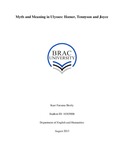Myth and meaning in Ulysses: Homer, Tennyson and Joyce

View/
Date
2013-08Publisher
BRAC UniversityAuthor
Shoily, Kazi FarzanaMetadata
Show full item recordAbstract
This is an attempt to decode the change in meanings in adaptations of Ulysses over the ages. The basis is set on the theory of myth provided by Roland Barthes. There are additional concepts that aid the argumentation as well. Mostly it will try to trace links and breakages that herald the beginning and ending of an era. As such, ideals left by the concepts of the Hellenic, the Victorian and the Modern are addressed in the dissertation through the texts by Homer, Tennyson and Joyce on Ulysses. This is done in three correlated chapters that formulate and modulate the formation of meanings in literary depictions. Although Eurocentric in outlook, the dissertation tries to see where these meanings have coalesced and digressed. While it will begin with particular features of the primary texts, the conclusion is about the style and structure of the narrative and how that has meant more to the meaning of the text with the passage of time. Thus this is an effort to find a cohesive linearity among ages that connect writers of different epochs.
Keywords
English and humanitiesDescription
This thesis is submitted in a partial fulfillment of the requirements for the degree of Bachelor of Arts in English, 2013.Department
Department of English and Humanities, BRAC UniversityType
ThesisCollections
- Thesis, B.A. (English) [624]
